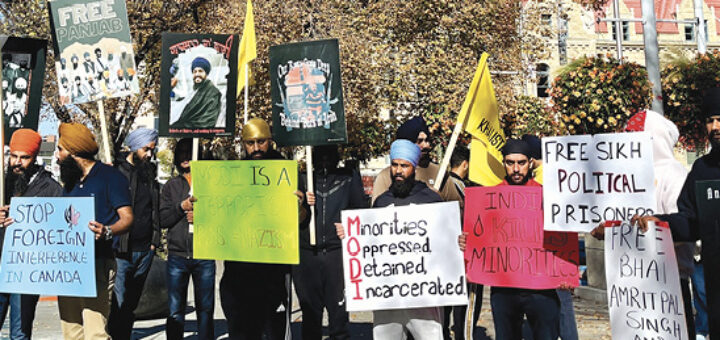Tensions between Canada and India continue

Jazmin Singh Kaur, Contributor |
Hardeep Singh Nijjar was a prominent Canadian-Sikh leader in Vancouver. For the Indian government, he was a criminal, but for Sikhs, he was a human rights activist.
He moved to Canada in 1997 and became a Canadian citizen in 2007. On June 18, 2023, he was shot dead outside a Sikh temple in Surrey, B.C. As to who the assassins were is still unknown, however, it is concluded that there were more than two people involved.
On Sept. 18, Prime Minister Justin Trudeau accused India’s government of being behind the assassination of Nijjar. Even though Trudeau said there was credible evidence that the Indian government was involved in the assassination, no further details have come forward.
Diplomatic tensions
Diplomatic relationships have been impacted by Trudeau’s accusation.
The Indian government denied everything that the Prime Minister said, and claimed that the accusations were absurd, according to AP News.
According to Al Jazeera, Nijjar was the president of the Guru Nanak Sikh Gurdwara in Surrey where he advocated for Khalistan. However, the movement of an independent Sikh state, Khalistan, is banned in India according to TIMES.
The current government in India, the Bharatiya Janata Party (BJP), under the leadership of Narendra Modi is pushing India to become a Hindu nationalist state.
The Indian government called Nijjar a terrorist. However, Nijjar advocated for Khalistan in Canada, not in India, and while Nijjar was advocating for the rights of the Sikh people, he never partook in any violent actions.
Additionally, many say the BJP government has oppressed minorities, and Indian journalists have even been arrested for criticizing Modi’s majoritarian rule according to the Atlantic.
A familiar story
Trudeau’s narrative may not be far off, as a similar storyline has played out before in India’s history.
Jaswant Singh Khalra was a human rights activist in India who uncovered how the Punjab police were behind the killing of thousands of Sikhs between 1984 and 1995. When he brought his discoveries to light, it was reported that Ajit Sandhu, superintendent of police from Tarn Taran, had said “If 25,000 have disappeared, it will be easy to make one more disappear too.”
On Sept. 6, 1995, he was abducted, tortured and abused. On Oct. 27, 1995, he was murdered. Khalra had come to Canada three months before his abduction. Muslims and Christians also live with the fear of getting killed or abused by the Hindu majority. However, the BJP government has not stopped the riots and keeps encouraging a Hindu nationalist government. Muslim shrines are burned and Christian churches are vandalized, according to NBC News.
Despite being a modern democratic country, India’s laws systematically discriminates against minorities.
Since partition, Sikhs have had a long history of grievances against the Indian government. When the BJP came into power, other minorities began feeling alienated in India.
Sikhs have sought redress and acknowledgment for the past atrocities. Some have investigated these issues, like Khalra, and tried to work with the Indian state to come to a resolution. Others have advocated that they will never get their fair share in India and want to form their own country, Khalistan.
“Many journalists seem to have taken their eyes off the ball. Instead of interrogating the victim (Hardeep Singh Nijjar), it might be more helpful if more attention was to be given to the alleged foreign interference of the perpetrator or to providing the public with a more nuanced account of the complex history of India-Canada-Sikh relations,” says Michael Hawley, Sikh studies professor at Mount Royal University.


